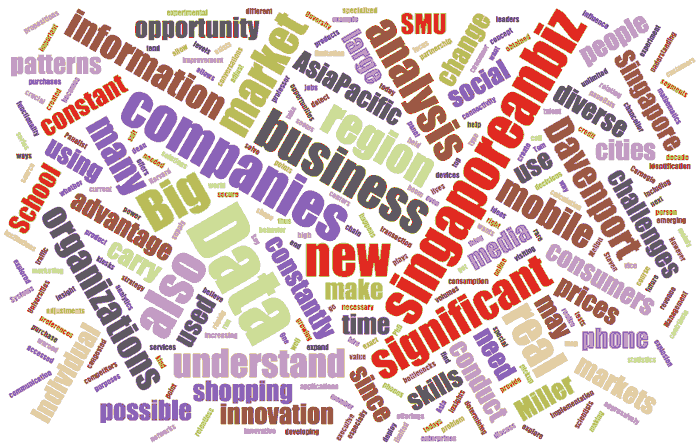The behavior of consumption and also the online conversations shape the volumes of business transaction. Social media plays it because of the boom of mobile devices and the increasing connectivity of consumers in the Asia-Pacific region. One thing that seems to have no end are the new ideas to create new applications or opportunities to secure new information. It also happens as new solutions to solve the challenges of the constantly growing region cities, the exact calculation of revenue from a new business opportunity and even detect bottlenecks in the supply chain.
The panel member and Harvard Business School visiting professor Tom Davenport said companies that take advantage of this power that big data and analysis have the opportunity to make right decisions, get insights and carry out the necessary adjustments more rápidp strategy their competitors. It is a significant advantage since the market lives in constant change. This type of insight allows companies to realize a significant improvement in its services or products, whether for an individual consumer or a market, may help prices when needed or adjust marketing.
The Singapore Management University in partnership with some institutions, including Carnegie Mellon, held many top jobs using big data in Singapore to conduct experiments in real time. An example is that in shopping centers, consumers can find kiosks with product offerings with special prices to suit them with data that were pickup through the cell phone them. It is possible through the identification of preferences and shopping patterns.
Of course, there are challenges in a diverse region where there is the implementation of large data analysis because real data may have a limitation, especially in emerging markets. However, the panelists believe that the explosion of mobile phone use becomes a current source of unlimited data and has the functionality for many purposes. The data relating to the purchase that is obtained using mobile phones have been used to contribute in determining credit points in a market, and other such data were used to understand and map the traffic patterns in more congested cities.
An executive who wants to deploy these significant data in Asia need to hire people who have high levels of skills in analytics and mathematics and that most of the time we understand that this talent is very rare in today's market, as well as in most world organizations also.
The Universities as SMU created a specialized focus in developing these skills. Panelist Steven Miller, vice chancellor and dean of the School of SMU Information Systems, warned that companies have the need to expand their concept of analysis since they want to make use of these significant data in innovative ways.
"It is not only a person who has a Ph.D. in statistics. This is an individual who has a real understanding of the information can provide to the business," said Miller. "The real problem that exists today in organizations is that the scientists go to until a limited point and business leaders over there, and there is no communication between them. It is important to discuss what is possible because this is crucial to innovation."
Davenport said that this experiment that big data offers can be explored aggressively by companies in the next decade. Big companies will run a relentless series of tests for various markets and segments, and thus will allow customers that they explore different value propositions. Big Data will also conduct a comprehensive analysis of the most accessed social media in this way large enterprises can understand how the various networks of people tend to influence each other when making purchases. Asia-Pacific has the key to the future with this kind of experimental innovation, mainly because it is a diverse region and constantly changing.
Davenport also said that most reputable companies are heading for constant experimentation and carry out thousands of small experiments. It is a culture change for many organizations, but the results will be amazing.

